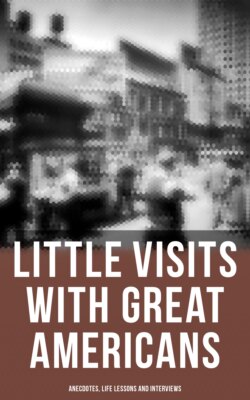Читать книгу Little Visits with Great Americans: Anecdotes, Life Lessons and Interviews - Эндрю Карнеги - Страница 44
На сайте Литреса книга снята с продажи.
CARNEGIE’S VIEWS ON THRIFT.
ОглавлениеTable of Contents
Once he wrote on the subject of thrift for a Scottish journal. He said:—
“The accumulation of millions is usually the result of enterprise and judgment, and some exceptional ability or organization. It does not come from savings, in the ordinary sense of the word. Men who, in old age, strive only to increase their already too great hoards, are usually slaves of the habit of hoarding, formed in their youth. At first they own the money they have made and saved. Later in life the money owns them, and they cannot help themselves, so overpowering is the force of habit, either for good or evil. It is the abuse of the civilized saving instinct, and not its use, that produces this class of men. No one needs to be afraid of falling a victim to this abuse of the habit, if he always bears in mind that whatever surplus wealth may come to him is to be regarded as a sacred trust, which he is bound to administer for the good of his fellows. The man should always be master. He should keep money in the position of a useful servant; he must never let it be his master and make a miser of him. A man’s first duty is to acquire a competence and be independent, then to do something for his needy neighbors who are less favored than himself.”
Mr. Carnegie has always lived up to this doctrine. He has made philanthropy a factor of existence. Already he has endowed over ninety libraries in different cities of the United States, having spent about $4,500,000 in this manner alone. He believes that a man can learn the science of true life and success in good books. In Scotland, where many of the residents of a poor hamlet have been benefited by his generosity, he is called “the good angel.” Whenever he visits any of these places, he is a greater man than the King of Great Britain.
While thus endowing the city where his fortune was made, he has not forgotten other places endeared to him by association or by interest. To the Allegheny Free Library he has given $375,000; to the Braddock Free Library, $250,000; to the Johnstown Free Library, $50,000, and to the Fairfield (Iowa) Library, $40,000. To his native land he has been scarcely less generous. To the Edinburgh Free Library he has given $250,000, and to his native town of Dunfermline, $90,000. Other Scottish towns to the number of ten have received helpful donations of amounts not quite so large.
“I should like you to say some other important things for the young man to learn and benefit by.”
“Our young partners in the Carnegie company have all won their spurs by showing that we did not know half as well what was wanted as they did. Some of them have acted upon occasions with me as if they owned the firm and I was but some airy New Yorker, presuming to advise upon what I knew very little about. Well, they are not now interfered with. They were the true bosses—the very men we were looking for.”
